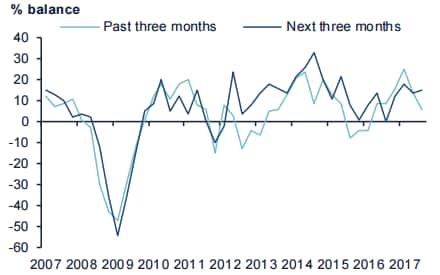Optimism among UK manufacturers falls

Manufacturers are feeling less optimistic about the state of their businesses, leading them to put off investing in new buildings, as growth in their order books slows.
The CBI Quarterly Industrial Trends Survey showed that while orders and output are still above historic levels, growth in manufacturing had eased slightly in the past quarter. Appetite among firms to invest in new buildings had fallen to its lowest level since 2009, to a net balance of -30pc. However, firms were still spending money in other areas such as staff training and innovation.
Overall orders were lower than the 399 firms surveyed would usually expect, at -2pc. This follows reports in July that their orders were 10pc better than normal. Optimism also dropped between quarters from 5pc to -11pc.
Manufacturers of building materials saw the largest fall in confidence, following reports of a slump in construction, their optimism fell from 6pc in July to -70pc in October.
However, order books for exports remained healthy, reaching their highest level since July 1995, and manufacturers expect both domestic and export orders to pick up over the next three months, as expectations for total new orders growth hit 20pc – the most positive level since April 2015.

These signs of less robust growth in manufacturing could dampen appetites among the Bank of England's Monetary Policy Committee for a rate hike to 0.5pc at the November 2 meeting.
Rain Newton-Smith, CBI Chief Economist, said that while it was encouraging that firm's plans for spending on innovation and training were holding their own, "a general softening in manufacturing over the past three months" had combined with a subdued outlook for investment.
In order to counteract this sluggish investment, Ms Newton-Smith suggested that the Government make new plants and machinery exempt from business rates.
Softer growth in the month did not indicate that overall activity in the sector for the year looked bleak, according to Andrew Wishart, UK economist at Capitial Economics, who argued that the overall picture is still that of positive momentum.
"The output expectations balance, which has a better relationship with the official manufacturing data historically, also fell, from 28pc to 19pc. Despite the fall, the measure is still consistent with solid manufacturing output growth of 3pc year-on-year, similar to the rate recorded in August."
"While October’s survey was disappointingly weak, it doesn’t change the picture of the manufacturing sector on course for a better performance than in recent years," he said.
Howard Archer, chief economic adviser at EY Item Club, said that the outlook for manufacturing appeared mixed as a promising export environment was counter-balanced with challenges at home.
"On the export side, a very competitive pound and healthy global demand are helping UK manufacturers competing in foreign markets. The weakened pound could also encourage some companies to switch to domestic sources for supplies, which would help manufacturers of intermediate products," he said.

 Yahoo Finance
Yahoo Finance 